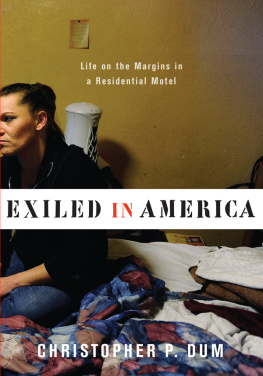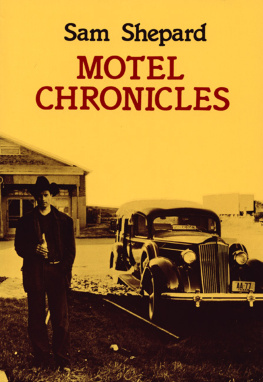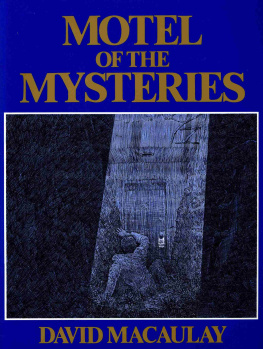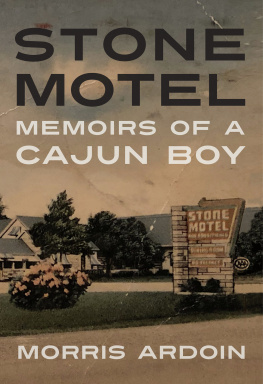Table of Contents
EXILED IN AMERICA
STUDIES IN TRANSGRESSION
Studies in Transgression
EDITOR: David Brotherton
FOUNDING EDITOR: Jock Young
The Studies in Transgression series will present a range of exciting new crime-related titles that offer an alternative to the mainstream, mostly positivistic approaches to social problems in the United States and beyond. The series will raise awareness of key crime-related issues and explore challenging research topics in an interdisciplinary way. Where possible, books in the series will allow the global voiceless to have their views heard, offering analyses of human subjects who have too often been marginalized and pathologized. Further, series authors will suggest ways to influence public policy. The editors welcome new as well as experienced authors who can write innovatively and accessibly. We anticipate that these books will appeal to those working within criminology, criminal justice, sociology, or related disciplines, as well as the educated public.
OTHER BOOKS IN THIS SERIES
Terry Williams and Trevor B. Milton,
The Con Men: Hustling in New York City, 2015
EXILED IN AMERICA
LIFE ON THE MARGINS IN A RESIDENTIAL MOTEL
Christopher P. Dum
Columbia University Press New York
Columbia University Press
Publishers Since 1893
New York Chichester, West Sussex
cup.columbia.edu
Copyright 2016 Columbia University Press
All rights reserved
E-ISBN 978-0-231-54239-5
Library of Congress Cataloging-in-Publication Data
Names: Dum, Christopher P., author.
Title: Exiled in America : life on the margins in a residential motel / Christopher P. Dum.
Description: New York : Columbia University Press, 2016. | Series: Studies in transgression | Includes bibliographical references and index.
Identifiers: LCCN 2016009591 | ISBN 9780231176422 (cloth : alk. paper) | ISBN 9780231542395 (e-book)
Subjects: LCSH: Sex offendersHousingUnited States. | Marginality, SocialUnited States. | Social isolationUnited States. | MotelsUnited States.
Classification: LCC HV6592 .D86 2016 | DDC 365/.34dc23
LC record available at https://lccn.loc.gov/2016009591
A Columbia University Press E-book.
CUP would be pleased to hear about your reading experience with this e-book at .
Jacket design: Noah Arlow
For Kim Gwang Soo and Kim Young Sook, who brought me into this world, and for Donna Hoffman and Richard Dum, who gave me the chance to explore it.
Not like the brazen giant of Greek fame,
With conquering limbs astride from land to land;
Here at our sea-washed, sunset gates shall stand
A mighty woman with a torch, whose flame
Is the imprisoned lightning, and her name
Mother of Exiles. From her beacon-hand
Glows world-wide welcome; her mild eyes command
The air-bridged harbor that twin cities frame.
Keep, ancient lands, your storied pomp! cries she
With silent lips. Give me your tired, your poor,
Your huddled masses yearning to breathe free,
The wretched refuse of your teeming shore.
Send these, the homeless, tempest-tost to me,
I lift my lamp beside the golden door!
Emma Lazarus, The New Colossus (1883)
CONTENTS
In 1993 National Public Radio (NPR) reporter David Isay arrived in the South Side of Chicago with a remarkable idea. His mission was to find two kids growing up in public housing and, in his words, hire them as reporters for a week and give them a chance to tell their stories. Isays methodology was brilliant in its simplicity. He would give his young reporters tape recorders to carry as they went about their daily lives, chronicling their thoughts and experiences as they happened. It was in the Ida B. Wells housing project that Isay found his young and insightful correspondents; thirteen-year-old LeAlan Jones and fourteen-year-old Lloyd Newman. For seven days in 1993 and a year from 1994 to 1995, the pair used the simple power of their voices to capture the realities of inner-city life. They also reported on the aftermath of the death of Eric Morse, who died at the age of five after he was dropped from the fourteenth floor of an apartment building by two other young boys. Using over a hundred hours of audio, Isay, Jones, and Newman produced two award-winning NPR segments and the book Our America: Life and Death on the South Side of Chicago. I read this book as a first-year doctoral student and it made me wonder, what other voices were waiting to be heard?
Many voiceless individuals are battling some sort of stigma that they feel they cannot reveal. According to sociologist Erving Goffman, stigma is an attribute that is deeply discrediting.
Yet the laws do have a tremendous impact on released sex offenders who try to reenter their communities. In surveys and interviews, many sex offenders report trouble finding jobs and securing housing, as well as the psychological effects of losing friends, feeling alone and isolated, being harassed in public, and fearing for their safety. These experiences may have distinct effects on the ability of sex offenders to reintegrate successfully into society. As I studied the lives of sex offenders, I wondered what it was like for them to live with these policies and the social stigma that surrounds their presence in the community. If someone empowered them to be the reporters of their lives, as Isay did with Jones and Newman, what would they say?
My initial explorations into the state sex-offender registry alerted me to the presence of the Boardwalk Motel ( In the fallout from this investigation, social services stopped housing families with children at the Boardwalk but continued to place adult clients there.
These revelations about the Boardwalk made it clear to me that the motel was not just a home for sex offenders. Rather, it housed a variety of marginalized populations (such as people who were mentally ill, disabled, struggling addicts, or working poor) who lived hidden from the public eye, in squalid conditions that many of us would consider unfit for habitation. I had found not only an interesting group of potential reporters but a unique location where they were socially embedded. The focus of my study then moved from a more general interest in how sex offenders lived in the community to a much more specific inquiry into how marginalized populations lived at this motel. Inspired by classic and contemporary ethnographic works, including Elliot Liebows Tallys Corner, Philippe Bourgoiss In Search of Respect, David Snow and Leon Andersons Down on Their Luck, Elijah Andersons Code of the Street, and Mitch Duneiers Sidewalk, I set out for the Boardwalk Motel to capture the voices of its residents. I ended up living there for a year, witnessing firsthand the small triumphs and many indignities that the residents faced every day.
This book is an exploration of the Boardwalk Motel told through the perspective of those most qualified to tell it: the residents themselves. I conceptualize these residents as social refugeespersons who have been impelled to relocate within their own country of citizenship because of the influence of social context and/or social policy. By recounting their experiences, often in their own voices, I analyze what it was like to live in the intimate world of the motel, as well as in the surrounding community. Motel residents faced stigma and stereotype not only from the citizens of Dutchland, who feared for the safety of their homes and children, but also from one another. My goal is to show how these social contexts influenced resident status, identity, and behavior.









